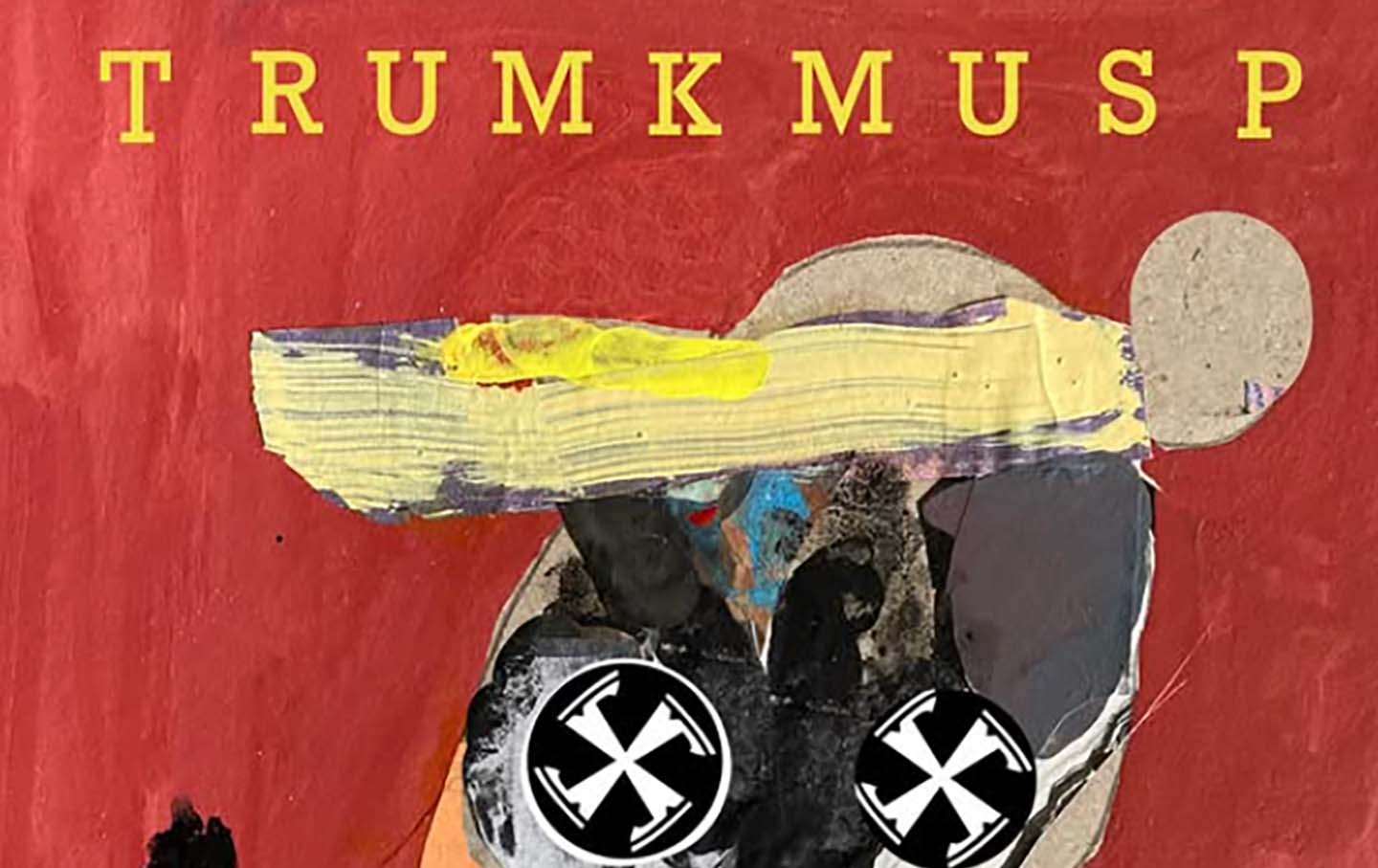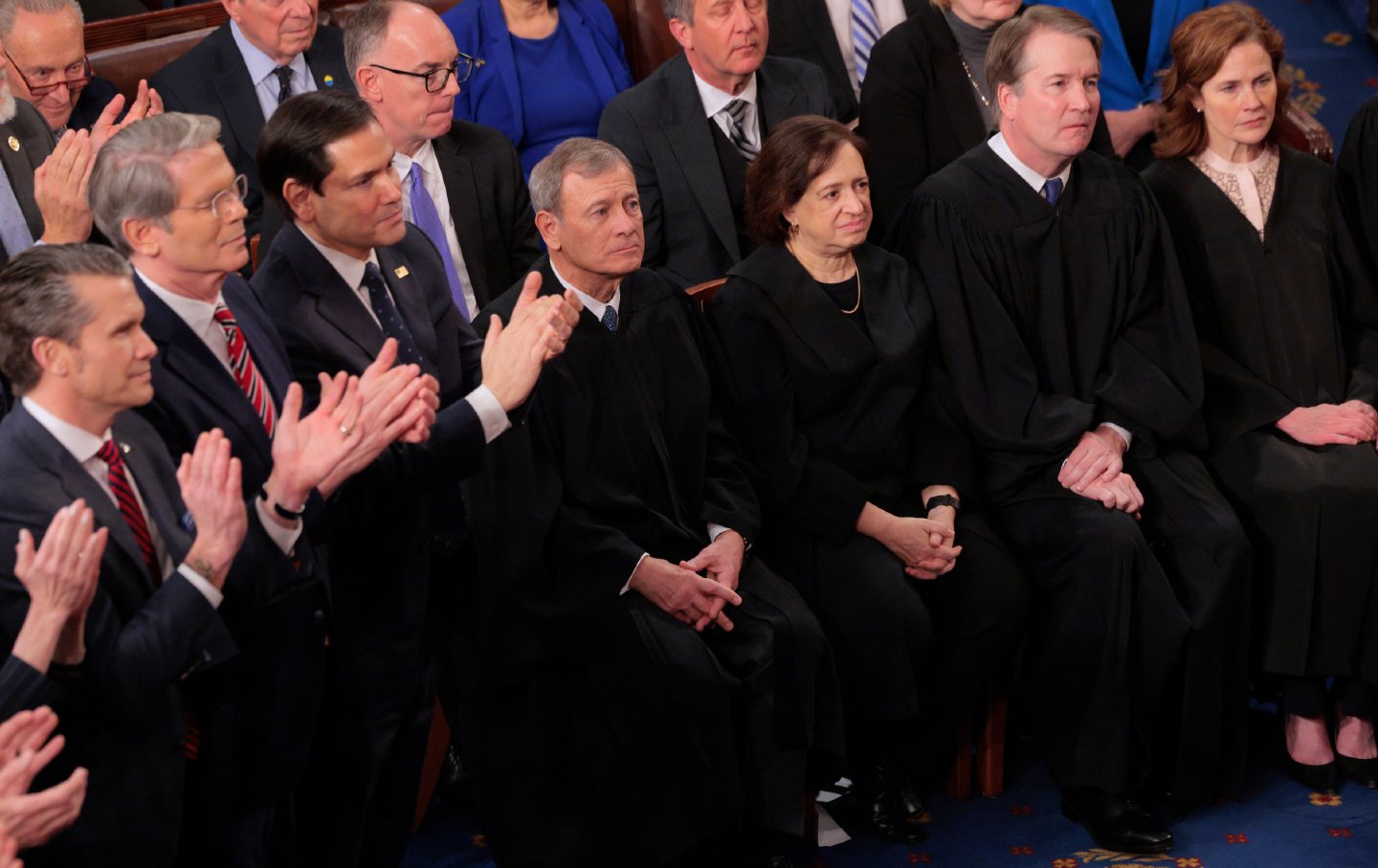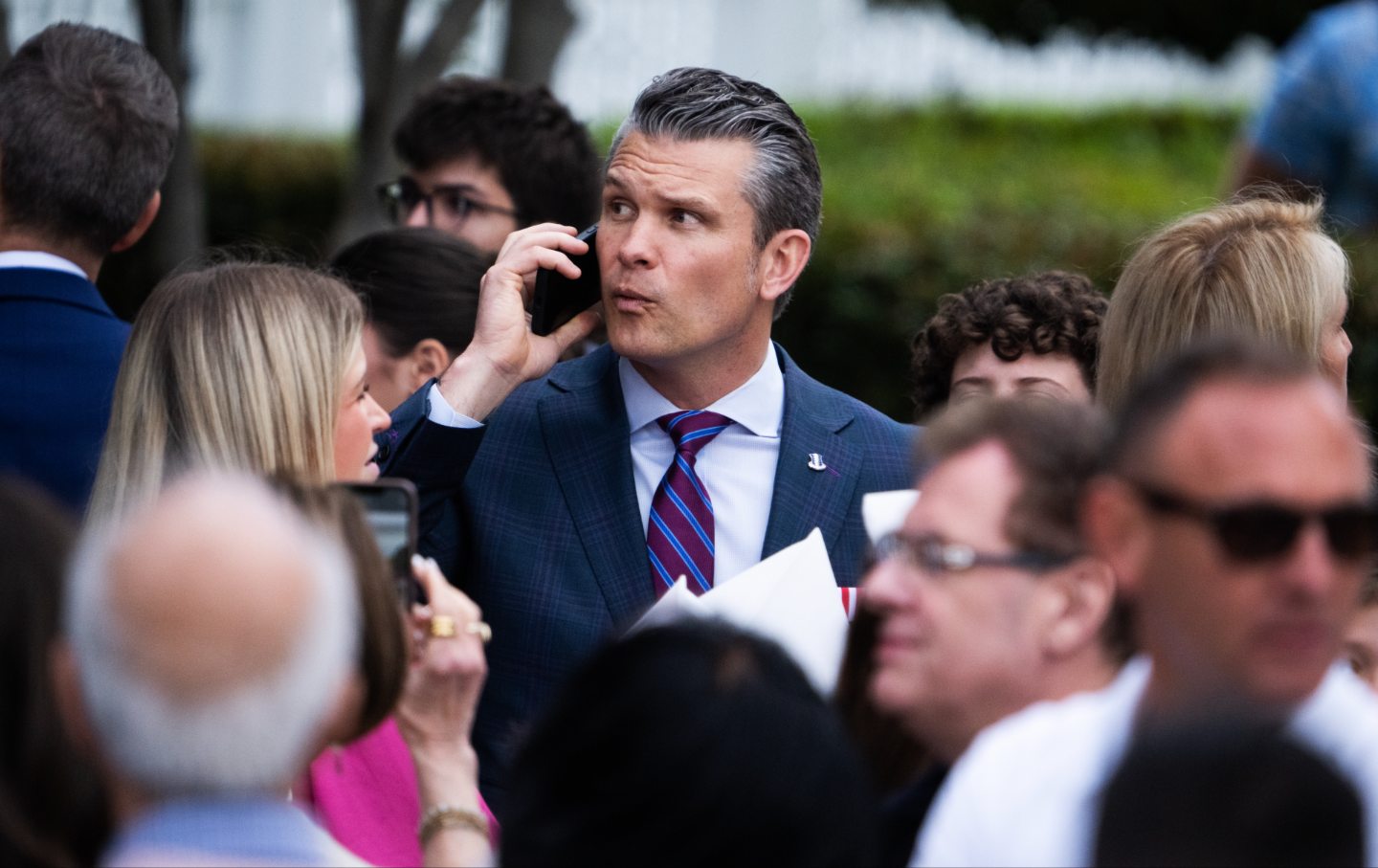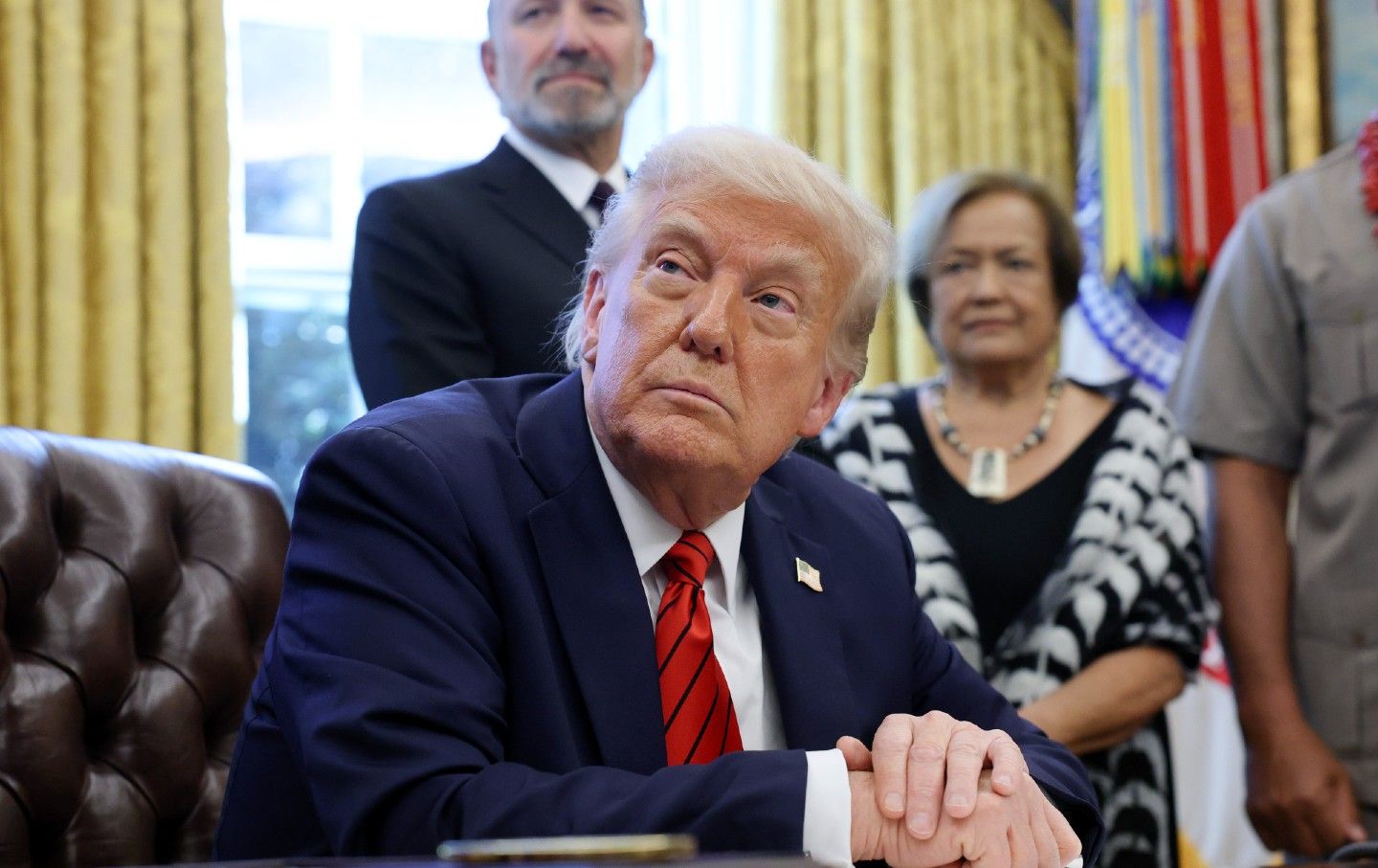Vivek Ramaswamy’s Edgelord Foreign Policy
We can see the future of Republicans’ ruling-class geopolitical agenda in his babble… and it sucks.
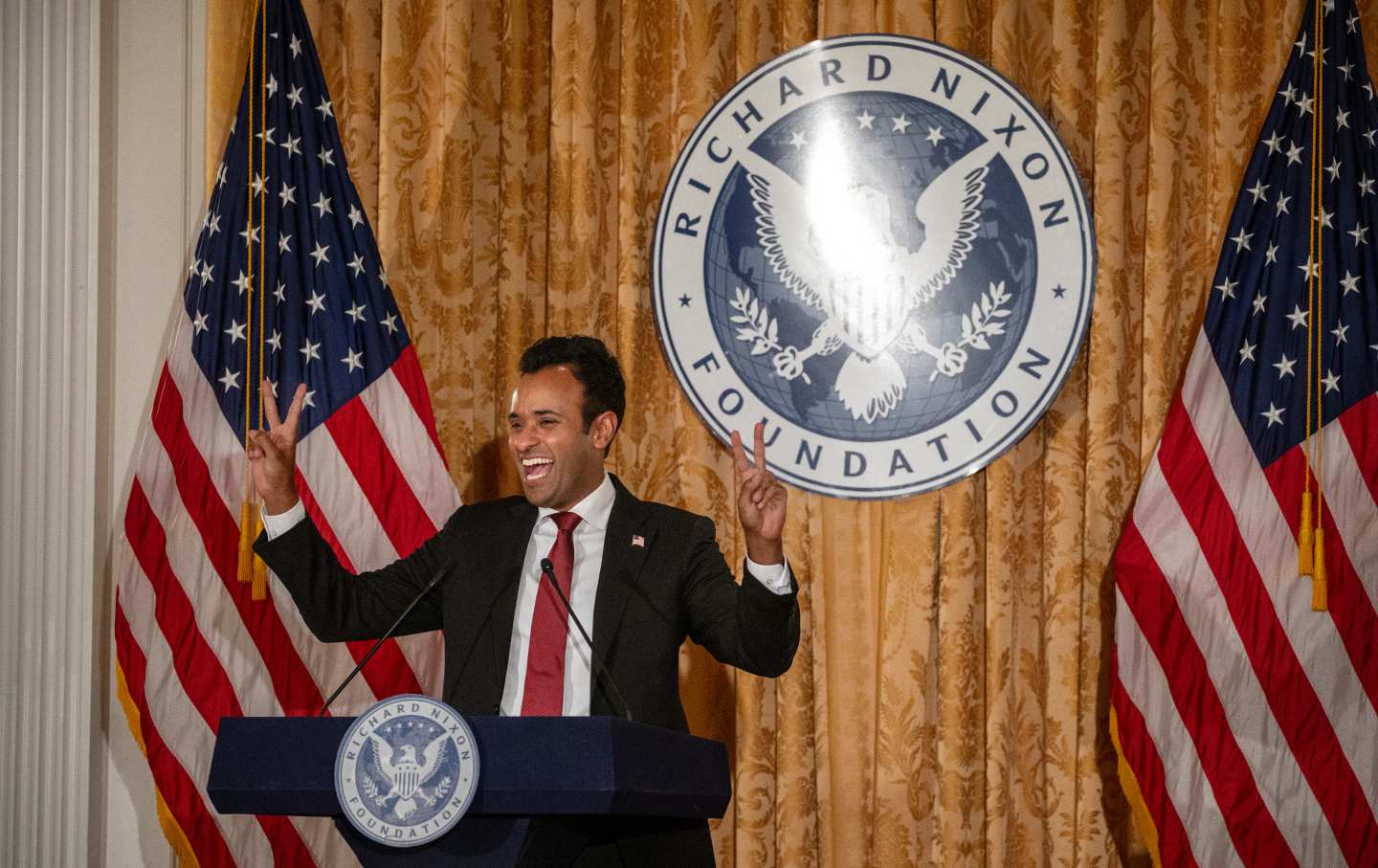
Vivek Ramaswamy speaks at the Nixon Library on Thursday, August 17, 2023, in Yorba Linda, Calif.
(Francine Orr / Los Angeles Times via Getty Images)When Vivek Ramaswamy appeared at the Nixon Presidential Library on August 17, it was hard to believe he was running for the Republican nomination for president. Only one year earlier, I’d seen Ramaswamy for the first time, on Real Time with Bill Maher.
Then, he came across just like any other “anti-woke” tech bro complaining that university campuses had become tyrannical places where the freedom to platform Nazis was disappearing.
Now, surrounded by oil paintings and bronze busts celebrating the only president to be forced to resign, Ramaswamy was trying to take his show global. The Ivy League–educated, hedge-fund plutocrat’s presidential campaign had been a goofy mash-up of full-throated Trumpism and promises to end the scourge of “wokeness.” To those planks, Ramaswamy was now bolting on a shock-value foreign policy agenda, which he dubbed the “modern Monroe doctrine.”
At first blush, Ramaswamy’s foreign policy can seem vaguely thoughtful, even coherent. His voice has a nerdiness that makes his ideas sound logical even when he’s uttering absolute nonsense. Upon closer scrutiny though, his ideas reveal themselves as a bricolage of bad history, MAGA references, and imperial intentions.
While it’s hard—even impossible—to imagine Ramaswamy becoming the Republican presidential nominee, his 2024 prospects are not why we should pay attention. He matters because he’s one of the only reactionary politicians around to try to assemble what might pass for a consistent foreign-policy logic out of the building blocks of white grievance, wealth grievance, QAnon dog whistles, and Trump rhetoric. We can see the future of Republicans’ ruling-class foreign policy in Ramaswamy’s babble…and it sucks.
With bouffant hair, a tech-boardroom cadence, and a smarmy persona, Ramaswamy used his Nixon Library speech to spout a series of propositions about America in the world that prescribed violent, oppressive solutions to fake challenges, while either ignoring or exacerbating the real ones.
Ramaswamy said he believes America is in the midst of a “national identity crisis.” In his theory of politics, the reason for Americans’ existential angst isn’t growing economic precarity, looming environmental catastrophe, or the dramatic rise in all forms of violence in America—it’s the replacement of traditional religion with secular gods that he described as “Wokeism, transgenderism, climatism, Covidism, globalism.”
To him, inequality and climate change are not nearly as threatening as the attempts to remedy them. And the far more menacing prospect is a world where we respect personal pronouns and alter bathroom signs to accommodate gender diversity.
Asking his audience what it means to be an American, he answered with a string of Republican-sounding non sequiturs: It’s “the rule of law”; it’s recognizing that affirmative action is racist; and it’s realizing the dream of the founding fathers to run government without “the deep state managerial bureaucracy that actually runs the show today.”
The essence of the foreign policy outlook from his speech was classic nationalist militarism: “Do not mess with the United States of America on our own home soil. You do not test us on our waters or in the Western Hemisphere. And if you do, you will have hell to pay for it.” This is what Ramaswamy called his “modern Monroe Doctrine”—a spin on the 200-year-old elitist belief in America’s supposed exclusive right to dictate terms to fully half of the planet (which was then supplemented by the belief that, upon reflection, the US should really dictate to the other half of the planet too). It imagines that the US is being “tested” by enemies when it isn’t. And it promises “hell to pay” without any consideration about who actually bears the burden of state violence.
The “Ramaswamy doctrine” presents itself as a critique of neoconservatism and American liberal hegemony. The trouble is with his understanding of what these war-prone ideologies of overcommitment actually are, and where his self-indulgent, hell-to-pay nationalism takes you policy-wise.
Ramaswamy’s answer to the problems of the going concern is what scholars in a previous era would’ve recognized as the farcical fantasy of a “fascist peace”—sacrificing entire nations by brokering spheres of influence with revanchist ethnonationalists abroad, freeing up America to patrol the Western Hemisphere at will, and to focus on something like permanent war against its own borders and the people within it. As the speech showed, Ramaswamy doesn’t want to end the militarized, imperialistic aspects of American liberal hegemony—he simply wants to end even the semblance of the obligations to the international order that have historically come with it and redirect those violent forces closer to home.
Popular
“swipe left below to view more authors”Swipe →The centerpiece of that proposal—and the part he’s most proudly crowed about on various right-wing media outlets—is cultivating ties with Vladimir Putin so as to better threaten war with Xi Jinping.
“Putin,” Ramaswamy said in the speech, “is the new Mao,” a comparison that led him to conclude that the US must romance Putin the way Nixon romanced Mao as part of Sino-US rapprochement in the 1970s. He called the supposed “Russia-China military alliance” the “single greatest threat we face.”
But this is a fever dream cooked up by the very neoconservative pundits Ramaswamy claims to repudiate. There is no military alliance between Russia and China against the United States. Ramaswamy misreads a 2001 “Treaty of Good Neighborliness and Friendly Cooperation” between Moscow and Beijing as a mutual defense treaty—a wild-eyed distortion.
His Nixonian gambit of befriending Putin to smite China addresses what is at best a hypothetical problem. Pursuing such a policy would both heighten confrontation with China and fail to deal with naked Russian aggression on its own terms.
Ramaswamy also bases these ideas on an incorrect reading of Cold War history. The Nixon-Kissinger opening to China was motivated partly by Nixon’s straightforwardly wanting to take the credit for reversing America’s China policy from containment to engagement. At the time, congressional Democrats were already making the case for engagement and Nixon wanted to beat them to it. And geopolitically, the purpose of the Sino-US rapprochement wasn’t to contain the Soviet Union—it was triangular diplomacy. Much later, under Reagan, friendship with China became more overtly about balancing against Soviet power—and on that basis, Reagan did more to build China’s military than any president before or since. None of this reality appears in Ramaswamy’s Wiki-history.
To implement such grandiose plans, Ramaswamy promised to prevent Ukraine from ever joining NATO, and said he was willing to end Russia’s war with Ukraine by partitioning Ukraine along current battlefield lines. In return, he said, Russia would remove its nuclear weapons from its border with Poland, “exit its military alliance with China,” and “remove its military presence in the Western Hemisphere.”
These proposals might sound reasonable if you heard them on TikTok. But Russia’s withdrawing nukes from its Polish border would change nothing about the nuclear balance or risks of future war. There is no military alliance with China for Russia to exit, so Putin would be able to satisfy that demand rather easily. And Russia’s “military presence” in the Western Hemisphere is close to nonexistent, and certainly not a threat to the United States.
Worse, there’s an alternative explanation for Ramaswamy’s unique obsequiousness and Ukraine-victim-blaming: Putin’s Russia has become a cultural beacon for the global far right and enjoys a weird amount of popularity in Republican politics. Ramaswamy could be suggesting how to bend foreign policy to reflect his party’s discomfiting admiration of white Christian nationalism.
And yet the most deranged aspects of Ramaswamy-style geopolitics involves a toxic stew of China and conspiracy-theory thought. He has referred to China as both America’s enemy and “actually communist China,” a phrase he repeated at the Nixon Library. This should go without saying, but China is not America’s enemy, and its government is not functionally communist—it’s a deeply reactionary authoritarian capitalist regime.
Ramaswamy’s grand bet on China policy is to compel Taiwan to build semiconductor factories in the United States (which the Biden administration is already doing) and decouple trade and investment ties with China so that, by 2029, the United States can be “independent” of China. Before 2029, he promises that he’ll match any Chinese invasion with a US counter-invasion. After 2029, he has signaled that he will end America’s commitment to defend Taiwan, giving China a green light should it choose to invade. This is reminiscent of when Trump endorsed Xi Jinping’s expansion of Uyghur internment camps in Xinjiang and China’s violent suppression of pro-democracy protests in Hong Kong—but on a much larger scale.
Aside from this throwing an entire democratic nation to the wolves, an uncritical observer might think, “Well, by abandoning Taiwan, America will at least avoid catastrophic war.” Except the opposite is true. Far from implementing a foreign policy of restraint toward China, Ramaswamy is both setting up new trip wires for war based on fake threats that appeal to the Republican base and using the China threat to redirect America’s most militaristic, oppressive impulses toward US borders and fellow Americans.
He wants to “hold China accountable” for “unleashing hell on the world” in the form of Covid-19. He warns of “pro-communist AI” taking over America from within. As examples of Chinese transgressions against his “modern Monroe Doctrine,” he cites Chinese “spy balloons,” “a spy base in Cuba,” and “Chinese-made fentanyl coming across the Southern border with Mexican drug cartels.” This is all conspiracy theory bullshit—edgelord foreign policy.
Ramaswamy says these things because his ideas are not his own. All of it—except the 2029 timeline—comes from the sludge that is the modern reactionary imagination. The Republican candidates for president are all keen to out-hawk each other on China, and have been collectively seized by the idea of not just giving Putin what he wants but also bombing Mexico in the name of confronting Beijing.
That Ramaswamy traffics in the same far-right talking points as other politicians affirms why he matters. Not necessarily for his own sake, or because he’s a serious candidate. Rather, he’s a weathervane for conservative politics. Some of his ideas do offer a dose of shock value, but that’s because they’re blatantly stupid or irresponsible. But that doesn’t matter when you’re in it for the lulz.
Hold the powerful to account by supporting The Nation
The chaos and cruelty of the Trump administration reaches new lows each week.
Trump’s catastrophic “Liberation Day” has wreaked havoc on the world economy and set up yet another constitutional crisis at home. Plainclothes officers continue to abduct university students off the streets. So-called “enemy aliens” are flown abroad to a mega prison against the orders of the courts. And Signalgate promises to be the first of many incompetence scandals that expose the brutal violence at the core of the American empire.
At a time when elite universities, powerful law firms, and influential media outlets are capitulating to Trump’s intimidation, The Nation is more determined than ever before to hold the powerful to account.
In just the last month, we’ve published reporting on how Trump outsources his mass deportation agenda to other countries, exposed the administration’s appeal to obscure laws to carry out its repressive agenda, and amplified the voices of brave student activists targeted by universities.
We also continue to tell the stories of those who fight back against Trump and Musk, whether on the streets in growing protest movements, in town halls across the country, or in critical state elections—like Wisconsin’s recent state Supreme Court race—that provide a model for resisting Trumpism and prove that Musk can’t buy our democracy.
This is the journalism that matters in 2025. But we can’t do this without you. As a reader-supported publication, we rely on the support of generous donors. Please, help make our essential independent journalism possible with a donation today.
In solidarity,
The Editors
The Nation

